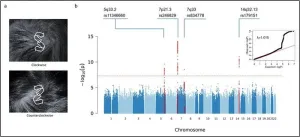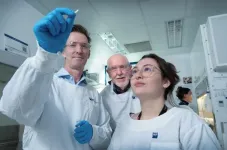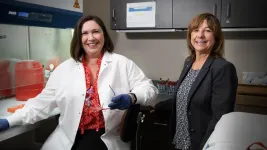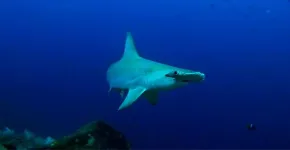(Press-News.org) Philadelphia, August 9, 2023 – The first gene mapping study on human scalp hair whorls not only shows that hair whorl direction has a genetic basis, but also that it is affected by multiple genes. Four associated genetic variants that are likely to influence hair whorl direction are identified, as reported in the Journal of Investigative Dermatology, published by Elsevier.
A hair whorl is a patch of hair growing in a circular pattern around a point specified by hair follicle orientations. As an easily observed human trait, scalp hair whorl pattern is typically defined by the whorl number (single or double whorl) and whorl direction (e.g., clockwise, counterclockwise, or diffuse).
Because atypical whorl patterns have been observed in patients with abnormal neurological development, understanding the genetic basis of whorl patterns may help unravel important biological processes.
The first genome-wide association study (GWAS) on human scalp hair whorls was performed among 2,149 Chinese individuals from the National Survey of Physical Traits cohort, followed by a replication study in 1,950 Chinese individuals from the Taizhou Longitudinal Study cohort.
Lead investigator Sijia Wang, PhD, Shanghai Institute of Nutrition and Health, Chinese Academy of Sciences, explained, "We know very little about why we look like we do. Our group has been looking for the genes underlying various interesting traits of physical appearance, including fingerprint patterns, eyebrow thickness, earlobe shape and hair curliness. Hair whorl is one of the traits that we were curious about. The prevailing opinion was that hair whorl direction is controlled by a single gene, exhibiting Mendelian inheritance. However, our results demonstrate that hair whorl direction is influenced by the cumulative effects of multiple genes, suggesting a polygenic inheritance."
The study identifies four associated genetic variants (at 7p21.3, 5q33.2, 7q33, and 14q32.13). These genetic variants are likely to influence hair whorl direction by regulating the cell polarity of hair follicles, with cranial neural tube closure and growth also potentially playing a role.
Professor Wang continued, "While previous work proposed the hypothesis of associations between hair whorl patterns and abnormal neurological development, no significant genetic associations were observed between hair whorl direction and behavioral, cognitive, or neurological phenotypes. Although we still know very little about why we look like we do, we are confident that curiosity will eventually drive us to the answers."
END
Having a bad hair day? Blame your genes!
A new study in the Journal of Investigative Dermatology uncovers the genes that dictate the direction of hair whorls
2023-08-09
ELSE PRESS RELEASES FROM THIS DATE:
New survey confirms need for more menopause education in residency programs
2023-08-09
CLEVELAND, Ohio (August 9, 2023)—Despite the fact that nearly 90 million women in the United States are projected to be postmenopausal by 2060, menopause remains low on the priority list of many residency programs. A new survey reveals the lack of a standardized menopause curriculum and limited access to menopause educational resources for residents. Results of the survey are published online today in Menopause, the journal of The Menopause Society.
Because women today are living longer, it is not surprising that there are a record number of postmenopausal women. And, that number is only expected ...
Booster shot being developed to avoid recapturing koalas to fight Chlamydia disease
2023-08-09
A booster vaccine using implant technology for koalas is being developed by QUT researchers in the fight against the deadly Chlamydia disease.
The new technology is designed to avoid problems for wild koalas and wildlife handlers having to recapture or hold the animals for 30 days, to receive a second immunisation.
Koala chlamydia is a bacterial infection and is one of the leading causes of death for Australian koalas.
QUT researchers have been successfully testing a two-shot vaccine on an isolated wild koala colony ...
After 15 years, pulsar timing yields evidence of cosmic background gravitational waves
2023-08-09
The universe is humming with gravitational radiation — a very low-frequency rumble that rhythmically stretches and compresses spacetime and the matter embedded in it.
That is the conclusion of several groups of researchers from around the world who simultaneously published a slew of journal articles in June describing more than 15 years of observations of millisecond pulsars within our corner of the Milky Way galaxy. At least one group — the North American Nanohertz Observatory for Gravitational Waves (NANOGrav) collaboration — has found compelling ...
Grant provides cancer research training experience to expand workforce for cancer prevention and control
2023-08-09
University of Arizona Cancer Center researchers were awarded a $1.5 million grant from the National Cancer Institute to deliver an intensive, multidisciplinary cancer prevention and control research training program for undergraduate and graduate students.
According to multiple principal investigators Jennifer Bea, PhD, and Cynthia Thomson, PhD, RD, the goal of the 10-week, full-time summer program is to motivate students to pursue a career in cancer prevention science.
“I am very concerned about the number of skilled scientists and clinicians retiring,” said Dr. Bea, co-leader of the UArizona Cancer ...
World’s largest study shows the more you walk, the lower your risk of death, even if you walk fewer than 5,000 steps
2023-08-09
The number of steps you should walk every day to start seeing benefits to your health is lower than previously thought, according to the largest analysis to investigate this.
The study, published in the European Journal of Preventive Cardiology [1] today (Wednesday), found that walking at least 3967 steps a day started to reduce the risk of dying from any cause, and 2337 steps a day reduced the risk of dying from diseases of the heart and blood vessels (cardiovascular disease).
However, the new analysis of 226,889 people from 17 different studies around the world has shown that the more you walk, the greater the health benefits. ...
Theory meets practice
2023-08-09
(Santa Barbara, Calif.) — Scientific findings don’t always translate neatly into actions, especially in conservation and resource management. The disconnect can leave academics and practitioners disheartened and a bit frustrated.
“We want conservation science to be informing real-world needs,” said Darcy Bradley, a senior ocean scientist at The Nature Conservancy and a former director of UC Santa Barbara’s Environmental Markets Lab.
“Most managers and practitioners also want to incorporate science into their work,” ...
$4M NIH grant will test worksite sleep health coaching for Arizona firefighters
2023-08-09
A $4 million award from the National Heart, Lung, and Blood Institute, a division of the National Institutes of Health, will allow researchers in the University of Arizona Mel and Enid Zuckerman College of Public Health to identify key factors for the successful implementation of workplace sleep coaching to improve sleep health in Arizona firefighters.
Almost half of career firefighters report short sleep and poor sleep quality, and about 37% of firefighters screen positive for sleep disorders like sleep apnea, insomnia or ...
Chemical contamination on International Space Station is out of this world
2023-08-09
Concentrations of potentially harmful chemical compounds in dust collected from air filtration systems on the International Space Station (ISS) exceed those found in floor dust from many American homes, a new study reveals.
In the first study of its kind, scientists analysed a sample of dust from air filters within the ISS and found levels of organic contaminants which were higher than the median values found in US and Western European homes.
Publishing their results today in Environmental Science and Technology Letters, researchers from the University of Birmingham, UK, as ...
$150,000 awarded to research race in clinical algorithms
2023-08-09
DALLAS, August 8, 2023 — As part of a focused effort to assess current cardiovascular treatment algorithms for racial bias, the American Heart Association, the single largest non-government supporter of heart and brain health research in the U.S., is funding three new scientific research projects at $50,000 each.
Clinical algorithms are formulas, flow charts and computerized “calculators” that work behind the scenes to analyze health data and help determine a person’s risk for heart disease or guide their ...
New guidance on safe injection practice in hospitals emphasises the importance of prefilled and labelled syringes in avoiding medication errors
2023-08-09
New guidance published in Anaesthesia (the journal of the Association of Anaesthetists) provides clear advice to reduce avoidable errors on all steps of the pathway involving injectable medications used routinely in anaesthesia care. The guidance has been written by a working party of UK anaesthesia experts that include Dr Mike Kinsella, Honorary Consultant, Department of Anaesthesia, University Hospitals Bristol and Weston, Bristol, UK and Chair of the Working Party.
The authors explain: “Peri-operative medication safety is complex. Avoidance of medication ...
LAST 30 PRESS RELEASES:
How can you rescue a “kidnapped” robot? A new AI system helps the robot regain its sense of location in dynamic, ever-changing environments
Brainwaves of mothers and children synchronize when playing together – even in an acquired language
A holiday to better recovery
Cal Poly’s fifth Climate Solutions Now conference to take place Feb. 23-27
Mask-wearing during COVID-19 linked to reduced air pollution–triggered heart attack risk in Japan
Achieving cross-coupling reactions of fatty amide reduction radicals via iridium-photorelay catalysis and other strategies
Shorter may be sweeter: Study finds 15-second health ads can curb junk food cravings
Family relationships identified in Stone Age graves on Gotland
Effectiveness of exercise to ease osteoarthritis symptoms likely minimal and transient
Cost of copper must rise double to meet basic copper needs
A gel for wounds that won’t heal
Iron, carbon, and the art of toxic cleanup
Organic soil amendments work together to help sandy soils hold water longer, study finds
Hidden carbon in mangrove soils may play a larger role in climate regulation than previously thought
Weight-loss wonder pills prompt scrutiny of key ingredient
Nonprofit leader Diane Dodge to receive 2026 Penn Nursing Renfield Foundation Award for Global Women’s Health
Maternal smoking during pregnancy may be linked to higher blood pressure in children, NIH study finds
New Lund model aims to shorten the path to life-saving cell and gene therapies
Researchers create ultra-stretchable, liquid-repellent materials via laser ablation
Combining AI with OCT shows potential for detecting lipid-rich plaques in coronary arteries
SeaCast revolutionizes Mediterranean Sea forecasting with AI-powered speed and accuracy
JMIR Publications’ JMIR Bioinformatics and Biotechnology invites submissions on Bridging Data, AI, and Innovation to Transform Health
Honey bees navigate more precisely than previously thought
Air pollution may directly contribute to Alzheimer’s disease
Study finds early imaging after pediatric UTIs may do more harm than good
UC San Diego Health joins national research for maternal-fetal care
New biomarker predicts chemotherapy response in triple-negative breast cancer
Treatment algorithms featured in Brain Trauma Foundation’s update of guidelines for care of patients with penetrating traumatic brain injury
Over 40% of musicians experience tinnitus; hearing loss and hyperacusis also significantly elevated
Artificial intelligence predicts colorectal cancer risk in ulcerative colitis patients
[Press-News.org] Having a bad hair day? Blame your genes!A new study in the Journal of Investigative Dermatology uncovers the genes that dictate the direction of hair whorls




